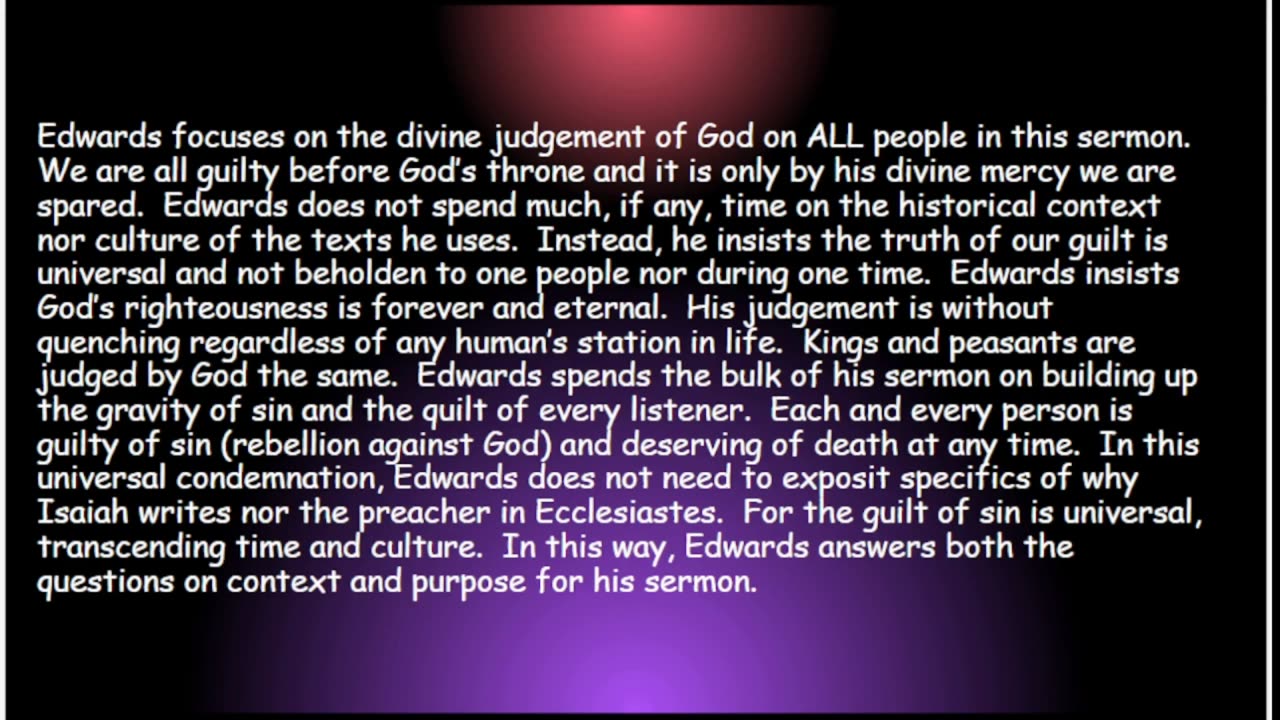Premium Only Content

God’s Love and Judgement A Review of Jonathan Edwards sermon
When listening to any sermon, one should consider well what is being said and postulated. Does the speaker read the reference text? Does he provide historical culture or context for such text? Does he justify or give purpose for the text for today? Does he preach the Gospel of Jesus Christ, insomuch as to show we are sinners separated from God and in need of a savior; Jesus of Nazareth being that perfect Savior? Lastly, let us look at the overall composition and presentation of the sermon.
Does Johnathan Edwards meet or exceed these expectations with his sermon, Sinners in the Hands of an Angry God? Let us look at the first question.
While reading Edwards’ sermon, I found it inescapable how he reads and references various texts to support his premise. First is Deuteronomy 32:35, followed by Psalms 73, 18 & 19, continuing with Luke 13:7 and John 3:18. Edwards does not shy from the source text and bases his exposition on the text proclaiming God’s sovereignty and justice. Edwards insists everyone is, at any moment, subject to God’s judgement and it is only by God’s grace that anyone is not sent at any moment to hell and destroyed. I cannot list all of the texts Edwards quotes, reads, or references throughout this sermon without droning on and risking losing my audience.
Edwards focuses on the divine judgement of God on ALL people in this sermon. We are all guilty before God’s throne and it is only by his divine mercy we are spared. Edwards does not spend much, if any, time on the historical context nor culture of the texts he uses. Instead, he insists the truth of our guilt is universal and not beholden to one people nor during one time. Edwards insists God’s righteousness is forever and eternal. His judgement is without quenching regardless of any human’s station in life. Kings and peasants are judged by God the same. Edwards spends the bulk of his sermon on building up the gravity of sin and the quilt of every listener. Each and every person is guilty of sin (rebellion against God) and deserving of death at any time. In this universal condemnation, Edwards does not need to exposit specifics of why Isaiah writes nor the preacher in Ecclesiastes. For the guilt of sin is universal, transcending time and culture. In this way, Edwards answers both the questions on context and purpose for his sermon.
Does Edwards preach the Gospel of Jesus Christ. Yes. A resounding yes. Edwards systematically and charismatically preaches the Gospel of Jesus Christ. From start to finish, Edwards shows the listener (reader) we are all sinners in need of saving. God’s divine Grace through Jesus Christ is what saves, and it is up to the individual to claim that Grace for themselves.
Lastly, let us look at the overall composition and presentation. Edwards presents multiple points in quick succession at two different points in his sermon. I found this to be unhelpful and distracting. I felt these lists of points were not differentiated well enough to warrant being considered separate points, but rather, continuations of the same point, namely, all have come short of the Glory of God. Overall, I can see how this “fire and brimstone” style of preaching caught on and became the hallmark of the Great Awakening. Yet I found myself less convicted and more intrigued. I was expecting Edwards to refer to John 3:16 & 17 when he went to verse 18 of that same chapter, yet he did not. I found myself anticipating Edwards to reference Romans 3:23, as I just did, yet he does not.
Edwards' sermon, Sinners in the Hands of an Angry God, states God is merciful, but one could miss it with the distinct focus of the wages of sin being death and destruction. Only in the last moments, does Edwards point the listener to salvation through Jesus Christ. He paints a picture of God just waiting to send people to hell. This picture has persevered in Christianity ever since. This concept of God being full of wrath and vengeance. While we may error by ascribing God the attribute of being all loving, we may also error as ascribing God the attribute of being all wrath. God is sovereign in both his love and his justice. For it is by grace man is saved and not by our own will. Yes we are guilty before God. And yet he still chose to save us through his grace and meted out his judgement of the innocent for us. Jesus is the only way for he is both God and man. He is the guiltless who took my guilt away.
90 & Out is a video commentary on the Christian Bible with new episodes uploaded periodically.
"The pursuit of knowledge is the beginning of wisdom" -ancient Jewish proverb
Get Merch @ https://www.stickermule.com/ce4c064d751047c
Or https://holtscountertops.etsy.com
Contact us @ [email protected]
On other platforms:
90 and Out on Facebook
https://www.facebook.com/share/r/15kWKTjtj6/
On Rumble
https://rumble.com/c/c-562805
On YouTube
https://www.youtube.com/@90out10
Thank you for watching this video and I hope it has impacted your life. Please subscribe for more video content. Comment, like, and share.
Or consider showing support with a monetary contribution using the PayPal link below.
https://www.paypal.com/ncp/payment/VD7ZP9QZB728U
All copyrights and trademarks are owned and retained by their respective holders.
Music was produced by Timothy Holt and is his sole intellectual property.
-
 1:24:37
1:24:37
90 and Out
1 month agoAddressing Alleged Bible Contradictions - Building for the Kingdom One Brick at a Time
941 -
 LIVE
LIVE
xLuigi34x
5 hours ago100 Follower Special! Going to 100% The DKC Trilogy on stream!
571 watching -
 50:27
50:27
Sarah Westall
3 hours agoMusk Helps Expose the Most Consequential Political Blackmail Operation in Modern British History
9.1K9 -
 LIVE
LIVE
Due Dissidence
12 hours agoTrump GOES NUCLEAR on MTG, Tucker Exposes Butler COVERUP, Shmuley SUED For HILARIOUS Reason
1,362 watching -
 20:13
20:13
RealReaper
7 hours ago $0.35 earnedPredator Badlands: If You Like This Movie Then I Hate You
8.85K10 -
 LIVE
LIVE
GritsGG
5 hours ago#1 Most Warzone Wins 4000+!
181 watching -
 41:54
41:54
Nicholas Bowling
6 hours ago $0.31 earnedWhile Preaching to Muslims, EX-MUSLIM Shares Why He Left Islam (London, UK)
9.15K8 -
 2:25:28
2:25:28
bucketofish
4 hours agoNoise Floor \\ Behind the Mix - Ep 002 - Wide Awake by Katy Perry
15.7K1 -
 3:07:04
3:07:04
Biscotti-B23
4 hours ago $2.05 earned🔴 LIVE DISPATCH PLAYTHROUGH & PARTY GAMES
14.7K -
 LIVE
LIVE
Lofi Girl
2 years agoSynthwave Radio 🌌 - beats to chill/game to
87 watching